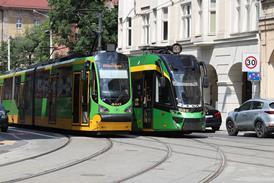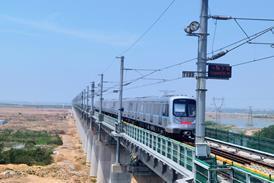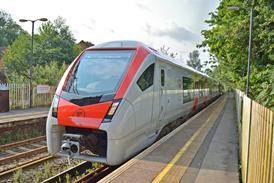Afghanistan - country profile
Difficult geopolitical and economic conditions have prevented the development of a domestic rail network, although several cross-border links are now operational with further construction proposed.
Australia - country profile
Most rail investment has focused on heavy-haul mineral traffic in Western Australia, Queensland and New South Wales. A 1700 km Melbourne – Brisbane Inland Rail freight corridor is under construction.
Austria - country profile
Austria’s geographical position makes it a key European transit route for both east – west and north – south rail traffic, with freight traffic increasing its modal share by a third between 2000 and 2010.
Belgium - country profile
Following completion of HSL 1, built to connect Brussels with the French section of LGV Nord Europe, Infrabel has overseen the construction of three more high speed lines.
Brazil - country profile
After decades of under-investment, the Brazilian state operator RFFSA was split up and privatised into concessions in 1997. Freight concessions were auctioned by the federal government.
Canada - country profile
Mainline freight operations are dominated by Canadian National and Canadian Pacific. Major cities are served by metro and commuter rail networks, and increasingly by light metro or light rail.
Chile - country profile
Chile has both metre and broad-gauge networks, with a mix of private and concessioned operations. In Santiago, investment in passenger services, especially the metro, has seen network expansion.
China - country profile
The world’s largest high-speed network continues to grow, and China is now creating an ‘8x8’ grid of routes. It has also opened more than 40 new metros since 2000.
Country and city map directory
Country and city maps listed by country, then alphabetically by city name
Czech Republic (Czechia) - country profile
The Czech Republic’s extensive rail network serves key flows of transit freight; open access and operating contracts are increasingly part of service provision.
Denmark - country profile
Fixed links across the Great Belt and Øresund have had considerable investment, with the Fehmarn Belt now following. There are ambitious plans for electrification, network and metro expansion.
Egypt - country profile
With a more stable political situation, Egypt’s network is now poised for investment in upgrading and resignalling, along with major projects. Cairo’s metro continues to grow.
Eswatini - country profile
Much of the network is moribund, leaving limited sugar exports through Mozambique and some imports via its Matsapha yard. The Swazilink project could bring significant investment.
Finland - country profile
Rolling programmes of electrification and incremental mainline upgrades have improved inter-city passenger services, with most of the network now fit for use by Pendolino and double-deck inter-city trains.
France - country profile
One of the pioneers of high-speed railways, France has invested heavily in developing its Paris-centred long-distance railway network by building new high-speed lines.
Germany - country profile
Since reunification much investment has been channeled into ‘unity projects’ meant to integrate east and west, into other high-speed railway projects, rolling stock and station modernisation.
Greece - country profile
Rail investment is bouncing back, following a period of financial difficulties since the 2008 financial crisis that stalled projects initiated during a surge of investment in the 1990s.
Hungary - country profile
Forming an important strategic link between eastern and western Europe, Hungary’s network is now starting to receive investment to enhance links to neighbouring countries.
India - country profile
India is pushing ahead with network-wide electrification, together with construction of high-performance freight and passenger lines.
Indonesia - country profile
Having seen decades of under investment, Indonesia is now seeing a resurgece in rail investment covering the existing main line network as well as new high speed projects and metro corridors in Jakarta.
Iran - country profile
Network expansion and upgrading continues, aiming to attract a greater share of domestic and international transit trafffic. Urban railways have been built or are under construction in eight key cities.
Italy - country profile
Italian network investment has focused on constructing the high speed and high capacity network Alta Velocità/Alta Capacità between the main cities.
Japan - country profile
There has been slow, but steady expansion of the Shinkansen network, with a government programme of extensions to the network until at least 2035.
Mexico - country profile
Mexico’s network carries almost exclusively freight, though a new line from Mexico City to Toluca and major project in Yucatán should see mixed traffic operations from 2023.
Morocco - country profile
Experiencing high traffic growth, ONCF has launched major investment in a high speed network and upgrades of the legacy network to support a fledging logistics business.
Mozambique - country profile
After decades of conflict and decline, the country’s rail network is being steadily rehabilitated and developed, in part through concessioning agreements.
Myanmar - country profile
MR has built more than 2200 km of new lines between 2004 and 2013, in addition to upgrading many of its existing routes and double-tracking the Yangon – Mandalay main line.
Netherlands - country profile
With a dense network of intensive passenger services and some of Europe’s largest ports, upgrading and extending the network is focussed on eliminating bottlenecks.
New Zealand - country profile
Now managed by state-owned enterprise KiwiRail, New Zealand has ambitions to upgrade rail infrastructure and grow freight and passenger traffic through a 10-year Rail Plan.
Norway - country profile
Several major renewal and capacity upgrading projects are in hand, with the inter-city triangle around Oslo seeing the most investment; double-tracking of the 450 km network is planned by 2030.
Panama - country profile
The sole railway, between Panamá City and Colón, was concessioned in 1998. Panamá City’s first metro line opened in 2014, with a second line added in 2019. A third line is under construction.
Philippines - country profile
With almost its entire former national rail network abandoned, the Philippines is developing from scratch starting with expanding the urban network serving Manila.
Poland - country profile
EU funding has been refocused on maintenance and renewals of the previously underfunded legacy network, with upgrading for higher speeds and some ETCS Level 1 signalling.
Qatar - country profile
The first phase of the Doha metro opened on May 2019, and the Lusail City tramway is due to open in 2020. Further metro is due to open in time for the 2022 FIFA World Cup, with main line railways planned.
Russia - country profile
State-owned railway RZD is being reformed, with increased investment tackling a backlog of maintenance and renewals. Urban rail is dominated by Moskva’s extensive and growing metro.
Saudi Arabia - country profile
Two vertically-integrated government companies operate the network, being expanded through heavy-haul, land bridge and high-speed projects. Metros are being built in Riyadh, Jeddah and Makkah.
Slovakia - country profile
Restructuring to separate infrastructure management from operations during the 2000s has been followed by private sector and open access services; infrastructure modernisation has improved efficiency.
South Africa - country profile
TFR’s freight volumes recovered during the late 2000s, due to a focus on heavy haul and trunk flows. PRASA runs extensive commuter services around the big cities and some inter-city services.
Spain - country profile
Spain has built the world’s second largest high-speed network, with several more lines under construction. State-owned operator RENFE faces some limited competition from open-access freight companies.
Sweden - country profile
Sweden has focussed on raising capacity and speed with some new construction. State-owned, open access and contract operators provide passenger services, with freight open to full competition.
Switzerland - country profile
Completion of Bahn 2000 infrastructure development in 2004 has raised passenger traffic, with follow-up Bahn 2030 launched in 2009. Alpine base tunnels aim at freight transit modal shift.
Thailand - country profile
Network upgrades including double-tracking have aimed at increasing capacity and reducing freight transit times. High speed plans remain at the development stage. Bangkok’s urban network is expanding.
Turkey - country profile
Renewal and expansion has included high speed lines from Ankara to Eskisehir in 2009, and to Konya in 2011. Istanbul’s metro has expanded greatly, and a dozen cities have built light rail lines.
Ukraine - country profile
Heavy usage and long distances makes the world’s thirteenth largest railway by route length also among the biggest by passenger-km and freight tonne-km.
United Arab Emirates - country profile
A national network for freight transport is under development, with the first section in service. Dubai has both metro and light rail, while Abu Dhabi is developing plans.
United Kingdom - country profile
Since restructuring and privatisation in the 1990s, infrastructure has now returned to public ownership. An electrification programme has stalled, and a planned high-speed cut back to a single route. Renationalisation of passenger operations has begun.
United States of America - country profile
Rail freight dominates having 40% tonne-km market share, whilst only the Northeast Corridor carries significant long-distance passenger traffic. Major cities have metro and light rail systems.
































































